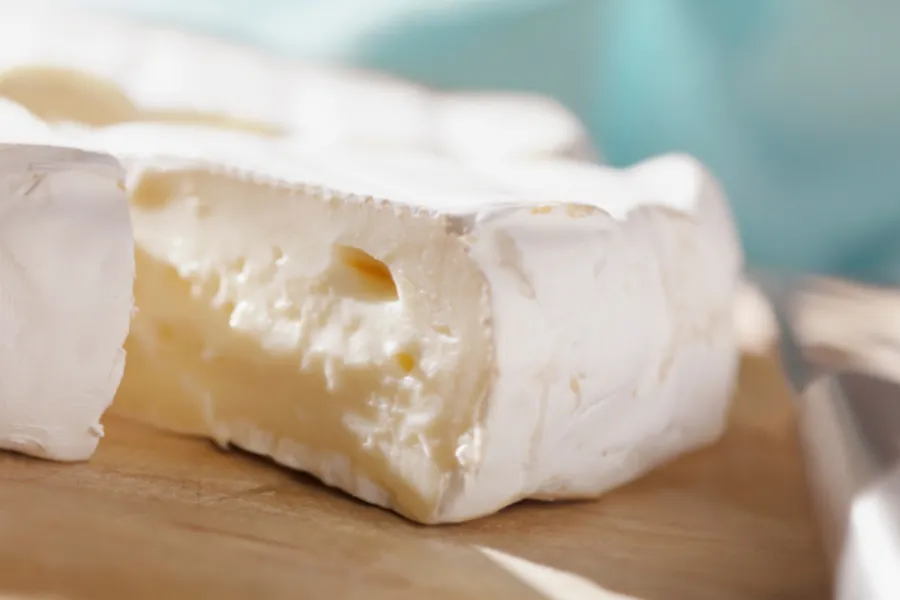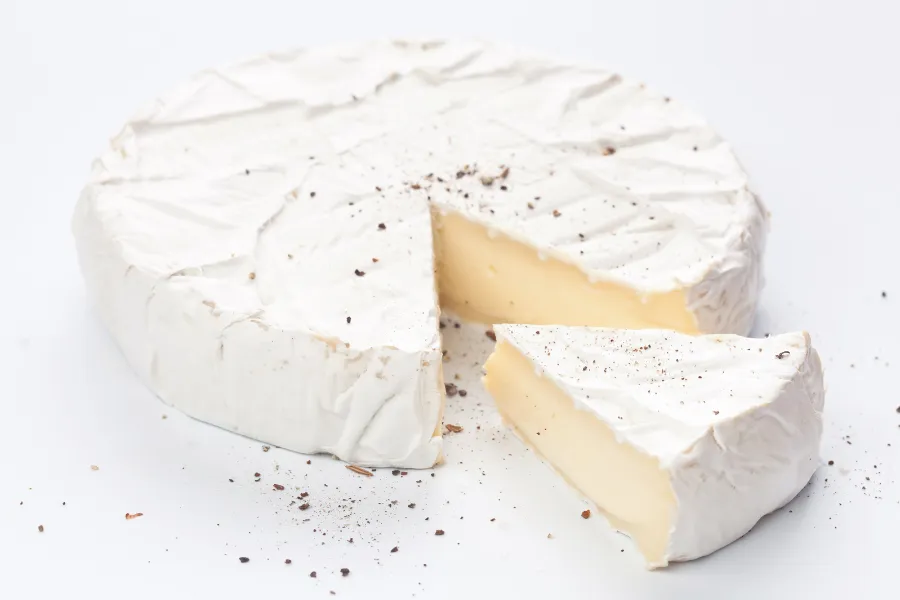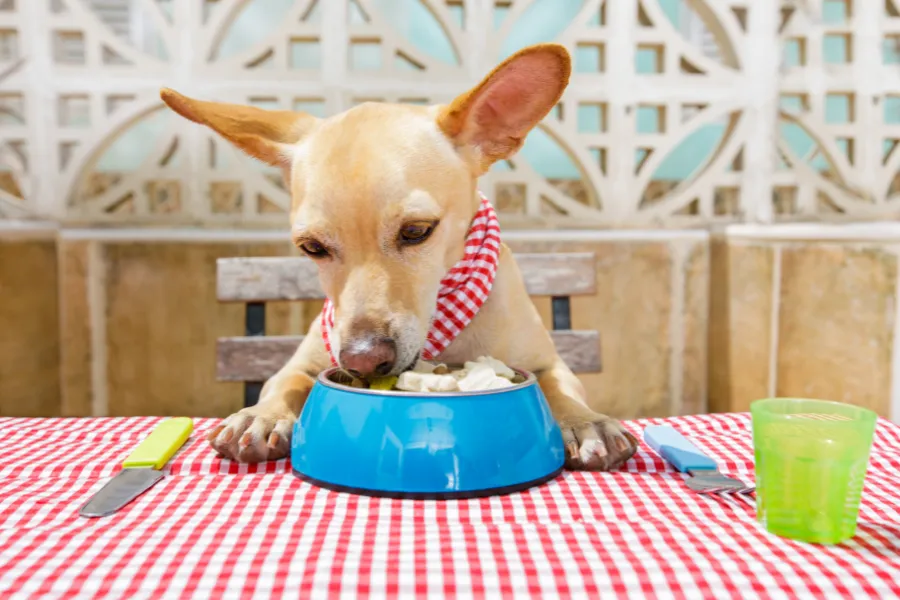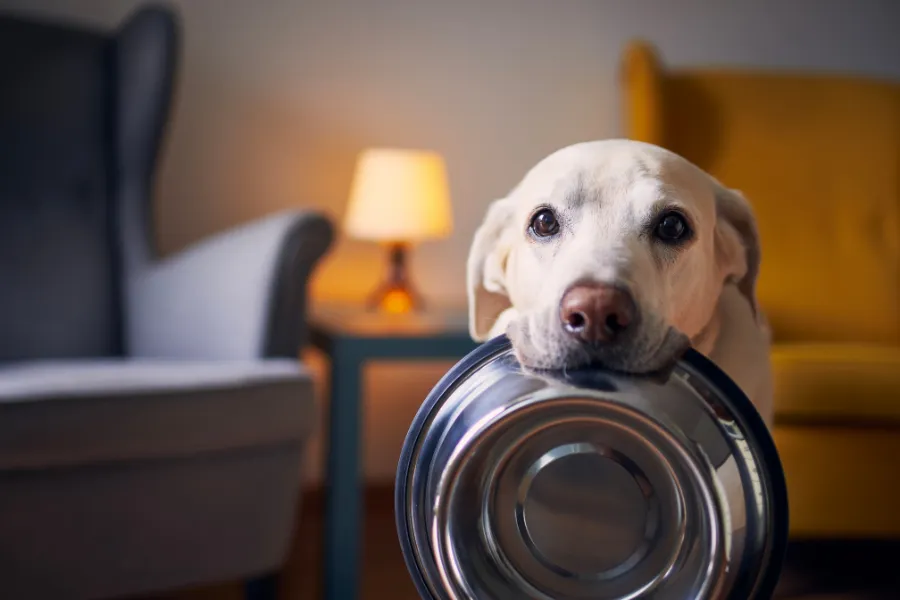Ah, Brie cheese. So creamy, so delicious. But can we share it with our four-legged friends? We all know how much dogs love to sample the food we eat, so it’s only natural to wonder if brie cheese is something we can safely share with them – or should it be avoided at all costs?
In this blog post, we’ll investigate the answer and find out once and for all: Can dogs eat brie cheese? Read on.
General Information On The Nutritional Value Of Brie Cheese And Can Dogs Eat Brie Cheese?
Brie cheese is a French cheese made from cow’s milk with a soft, creamy texture and mild flavor. It is considered one of the tastiest cheeses and is found in many dishes worldwide. But can dogs eat brie cheese?
The answer is yes. According to AKC, dogs can eat brie cheese as an occasional treat in moderation. Brie contains beneficial properties like fats, proteins, and carbohydrates, making it a protein-rich treat for your pup. It also contains essential amino acids and essential fatty acids that are beneficial for dog digestion, as well as calcium that helps strengthen bones and teeth in aging dogs. Of course, it should be given to your dog alongside fresh fruits like strawberries, kiwi, and apples, which are good sources of antioxidants. And forget the rind—it flavors bitter!
Regarding nutritional value, some nutritionists say brie cheese is okay for dogs since it contains high-fat levels. However, high fat can pose health risks to your pup if taken too regularly or in large quantities. The same goes for other fatty dairy products like cream or ice cream—they should all be given sparingly not to upset your pup’s stomach or add unnecessary calories to their diet without providing additional nutrition benefits.
At first glance, brie cheese can appear to be a safe food option for dogs since it is derived from cow’s milk and contains no visible additives such as onions or garlic, which are known to be toxic to animals. However, this cheese is often produced with added molds that give it its characteristic taste and texture. These molds can pose a health risk for dogs – including a potentially dangerous allergic reaction – because their bodies are not equipped to handle them properly. Therefore, the likelihood of their consuming Brie safely is low. In addition, because of its high-fat content (which could cause stomach issues such as diarrhea), overeating Brie could result in severe health problems for your dog.
Due to these risks associated with consuming brie cheese, the safest action is to avoid sharing this food with your pet or feed them only small amounts in a rare treat form (such as homemade treats made with brie cheese). If you decide to share some of your favorite dairy snacks with your pup, ensure they have access to plenty of fresh water afterward since Brie has a relatively high salt content. Additionally, monitor them closely after feeding them anything new; if any signs of discomfort or illness arise within 24 hours after consumption, then take your pet immediately to the vet for medical attention as soon as possible.
If you decide to feed your pup brie cheese instead of their regular meal from time to time, then make sure you cut off the rind before feeding it and closely monitor portion size so as not to overload them with fat per meal or account for extra calories at each sitting! Additionally, before owning a dog, you should consult your vet regarding this decision just in case of allergies or general health issues.

Potential risks associated with feeding Brie cheese to dogs
There are a few potential risks associated with providing Brie cheese to dogs.
- It has high amounts of fat, which can make dogs overweight and cause pancreatitis.
- It can contain mold, which is toxic to dogs and can cause serious health problems.
- Brie cheese contains lactose, which some dogs can’t digest well and can cause discomfort.
- It contains a protein called casein, which can cause stomach upset in dogs.
- Brie cheese can contain xylitol, a highly toxic sweetener to dogs, and can cause hypoglycemia and liver failure.
- Feeding too much Brie cheese can lead to health problems, and it should be given as a treat in small amounts and only after consulting a veterinarian.
Review of alternative dairy treats that can be safely given to dogs
When considering what treats to give your pet, it’s essential to be mindful of their dietary health and safety. While brie cheese may be a tasty treat for humans, dogs should generally avoid eating this delicious dairy product due to the potential for health issues.
To ensure that your pet enjoys safe treats, you might consider plenty of alternatives, such as:
Yogurt
Plain yogurt with no added sugar is a good option for pets because it has probiotics that aid digestion. However, steer clear of products with artificial sweeteners as they could potentially be harmful.
Cheese
Hard cheeses such as Cheddar or Swiss make great alternative treats because they are aged and have reduced lactose levels compared to soft cheeses like Brie.
Meat Treats
Protein-rich meat snacks are better options than dairy products because they don’t contain any lactose, which could upset your pup’s gastrointestinal system if ingested too often or in high doses.
If you want to reward your furry friend with something more unique than their usual treats, there are many alternative options instead of giving them unhealthy brie cheese. With careful consideration when selecting foods for your pet’s diet and treats that are safe to consume, you’ll ensure that your four-legged family member enjoys the best quality nutrition possible!

Which Cheeses Are Dangerous for My Dog?
Cheese can be delicious and nutritious for humans, but what about our furry friends? Knowing which types of cheese are safe and which can potentially be toxic or cause health problems for our canine companions is essential.
One type of cheese that should be avoided is Brie cheese. While Brie is a very flavorful, creamy, and smooth cheese, it contains high levels of salt and fat that could prove hazardous to your pet’s health. In addition, the mold cultures often found in Brie are dangerous for humans and animals. So, if you want to treat your dog with some cheesy goodness, it’s best to keep them away from Brie altogether.
Other cheeses that should not be given to dogs include:
- Cottage cheese (too high in fat/salt content)
- Ricotta (high-fat content)
- Processed cheeses such as string or cream (generally containing too many preservatives).
Hard cheeses such as cheddar or gouda are generally acceptable for dogs in moderate amounts since they have lower fat levels than other highly processed cheese variants.
Before giving your dog any new food item – even a seemingly harmless one like cheese – make sure you speak with their veterinarian first and get their opinion on whether the food type is safe for your pup!
How much brie cheese can a dog safely consume as a treat?
Brie cheese can be given to dogs in moderation as an occasional treat, but there are a few things you should consider before feeding it to them. While the fat content of brie cheeses varies, most have between 20-25 percent fat, which could cause digestive upset if your dog consumes too much.
Some brie cheeses may also contain blue molds or other types of mold, which are also not recommended for canine consumption due to potential allergies and respiratory issues. If your dog has food sensitivities or any known health issues, it would be best to avoid giving them this type of cheese as a treat altogether.
Dogs should consume only a small amount of brie cheese as a treat because of its high fat and mold content. The safe amount of brie cheese for dogs will vary depending on the individual dog’s size, breed, and health.
It is always recommended to consult with a veterinarian before introducing new foods to your dog’s diet. Generally, a good rule of thumb is limiting treats to 10% of a dog’s daily calorie intake.
For example, a small dog should not have more than 50 calories from treats per day, and a large dog should not have more than 150 calories from treats per day.
It’s best to give small pieces of Brie cheese, no more than a small cube, once or twice a week. Additionally, It is essential to monitor your dog after giving them brie cheese as symptoms of a cheese allergy or intolerance, including vomiting, diarrhea, or other gastrointestinal issues, can occur. In that case, discontinue the cheese and seek veterinary advice.
As always with treats, supervision is essential – ensure that no parts are swallowed whole or consumed in large quantities!

What are the symptoms of brie cheese poisoning in dogs?
Brie cheese is a delicacy humans enjoy, but it can make your pet sick if he consumes it. While the symptoms of brie cheese poisoning in dogs vary depending on the amount ingested, it’s best to take your pup to the veterinarian if you suspect he’s consumed brie cheese. Here are some common symptoms to watch out for in case of brie poisoning:
Vomiting
Vomiting may occur within 15-20 minutes of ingestion and may be sporadic throughout 24 hours. In addition to vomiting, a dog may experience abdominal pain as well as drooling and other signs of discomfort.
Diarrhea
If your dog has ingested too much brie cheese, he may also develop diarrhea. This will typically occur within six hours of consuming the cheese and will usually be accompanied by other stomach distress, including bloating and flatulence (gas).
Lethargy
Lethargy can be observed after ingesting any food product that doesn’t agree with a pup’s digestive system or stomach, so you’ll need to keep an eye on his activity level after consuming brie cheese. Changes in appetite or activity levels should be noted for possible veterinary intervention later.
Dehydration
Excessive vomiting or diarrhea due to brie poisoning can also lead to dehydration in dogs. Watch for these signs, such as puffy eyes, reduced skin elasticity, and excessive panting – all signs indicate potential water loss from an upset intestinal system tract resulting from cheesy consumption!
Are there any specific breeds or types of dogs that should not eat brie cheese?
Are there any specific breeds or types of dogs that should not eat brie cheese? While all dog breeds should eat only small amounts of this product due to its fat content, there are certain breeds, such as Akitas, Boxers, and Pugs, that may have more trouble digesting this type of food because they tend to have shorter gastrointestinal tracts than other breeds do; therefore they cannot handle as much fat in their diets.
It’s essential to consider the size of your pup when giving them treats like grilled chicken or hard-boiled eggs versus Brie because small dogs will likely face more health risks due to the high-fat content found within this delicious delicacy. So if you’re considering feeding your pup brie cheese at any point or have questions about your pup’s diet overall – please consult with a veterinary expert before introducing new snacks into their diet routine.

Is it necessary to consult a veterinarian before introducing brie cheese to a dog’s diet?
Consult a veterinarian when introducing new food items into your pet’s diet is always advisable. Dogs need to have a balanced diet that meets their specific nutritional needs, and introducing brie cheese can introduce too much fat and salt.
Brie cheese is usually safe for dogs if served in moderation and without other ingredients added. Although Brie has some nutritional benefits, feeding too much can lead to weight gain due to its high-fat content. Moreover, consuming large quantities of Brie can also cause digestive distress due to its high salt content.
How Brie is prepared or served also plays a vital role in determining dogs’ safety. For example, most Brie is glazed with apricot jam or nuts, which should be avoided due to the potential risk of choking hazards posed by more significant fruit or nut pieces. A dog can have an allergic reaction from eating brie cheese, so it’s essential to observe after consumption.
It’s essential to know the size and breed of the dog before starting them on cheese, as certain small-breed dogs can be more sensitive than their larger counterparts when it comes to ingesting different food items, including cheeses like Brie. No matter what breed or size dog you have, introduce new foods slowly and in small amounts while observing them after they eat each serving – make sure your veterinarian OKs all foods before feeding them in any part – especially if there is a pre-existing health condition or concern associated with your pup!
Conclusion on whether Brie cheese is suitable for dogs to eat or not
When it comes to whether or not brie cheese is ideal for dogs to eat, there are a few essential points to consider:
- Firstly, brie cheese can contain Listeria monocytogenes, which can be fatal for dogs if ingested in large quantities.
- Secondly, brie cheese is high in fat content, so it should only be given in small amounts as a treat.
- Lastly, some dogs are lactose intolerant, so they should not consume dairy products such as brie cheese.
In conclusion, while small amounts of brie cheese can be given as an occasional treat under supervision, it is not recommended to be included as part of a regular diet for dogs due to its potential risks. When giving your dog a treat such as brie cheese, it is essential to ensure that it does not show any adverse side effects after consuming the product or becomes ill from overeating it at once.
